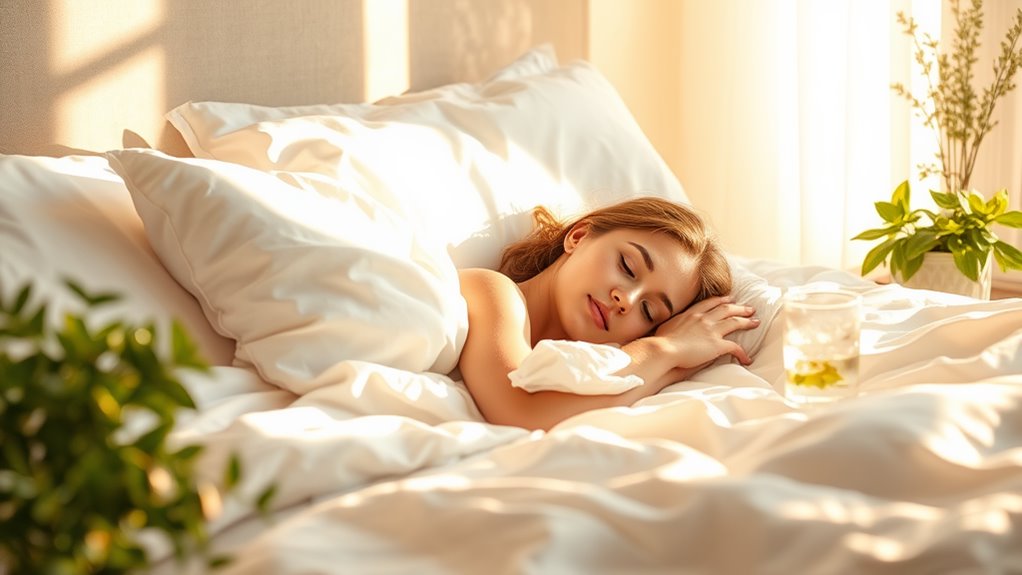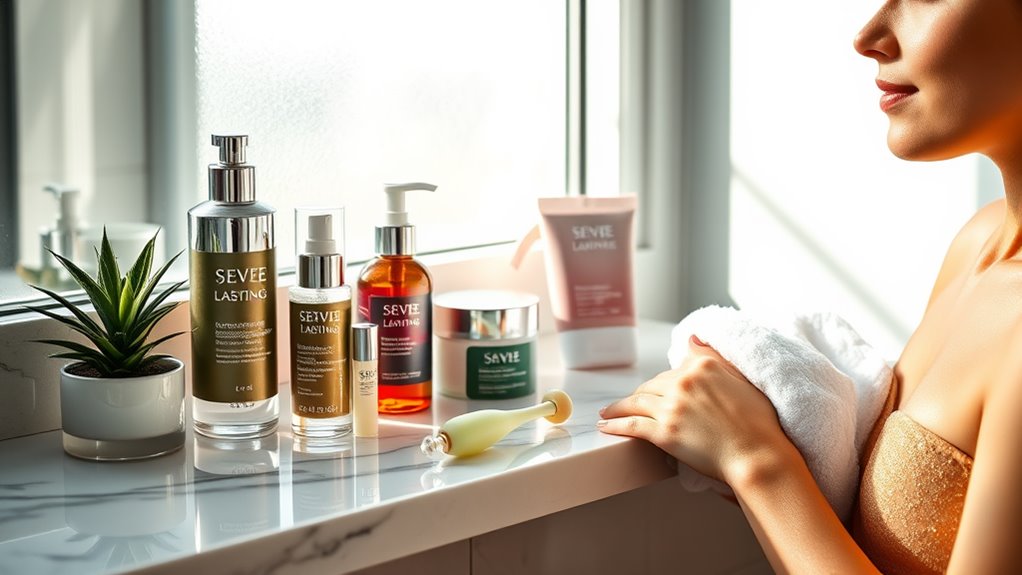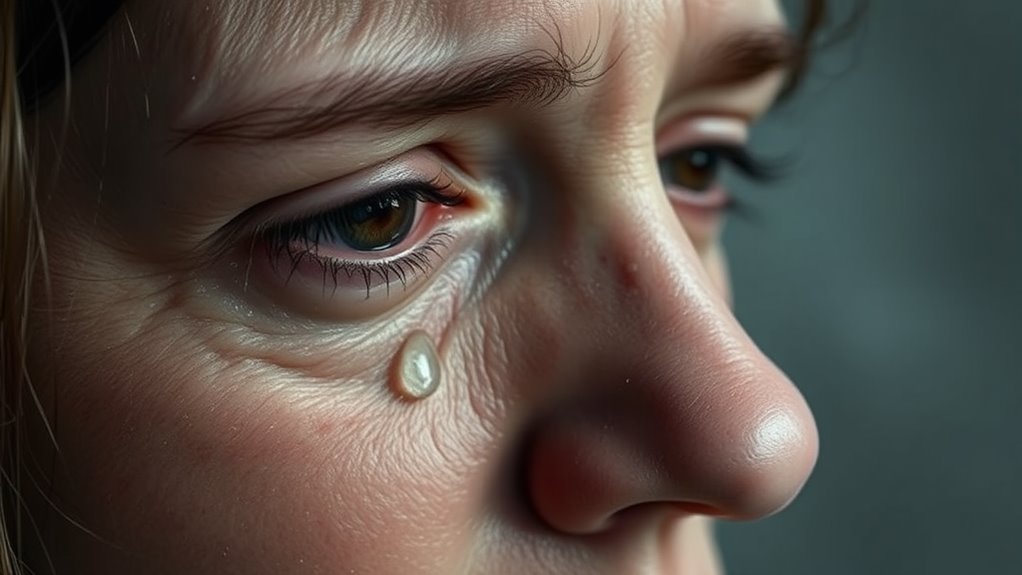Sleep Like This and Wake up With Healthier Skin
To wake up with healthier skin, prioritize quality sleep. Aim for 7-9 hours per night, as this is crucial for collagen production and skin repair. Create a relaxing environment with a cool room, dim lighting, and blackout curtains. Sleep on your back to minimize face pressure and improve circulation. Incorporate a gentle skincare routine before bed to maximize hydration. Discover more about optimizing your sleep and skincare habits to enhance your skin’s appearance and vitality.
Key Takeaways
- Prioritize 7-9 hours of quality sleep each night to enhance collagen production and skin repair processes.
- Create a relaxing sleep environment with optimal temperatures, dim lighting, and blackout curtains to promote restful sleep.
- Sleep on your back to minimize pressure on your face and improve circulation for healthier skin.
- Establish a consistent nighttime skincare routine with hydrating products to maximize skin repair while you sleep.
- Incorporate sleep-supporting foods like almonds and fatty fish into your diet to boost both sleep quality and skin health.
The Importance of Quality Sleep for Skin Health
When you sleep, your body undergoes critical repair processes that directly impact your skin’s health.
During deep sleep stages, your skin regenerates, repairing damage caused by environmental stressors and UV exposure. Growth hormone levels peak, stimulating collagen production and cellular turnover, essential for maintaining skin elasticity and firmness. Additionally, better sleep habits can significantly enhance your skin’s ability to recover overnight.
To maximize these benefits, implement beauty sleep tips such as establishing a consistent sleep schedule, aiming for 7-9 hours of quality rest, and practicing relaxation techniques before bed.
These actions enhance your sleep quality, allowing your skin to recover optimally. Additionally, avoid screens before sleeping to prevent blue light interference with melatonin production.
Prioritizing quality sleep not only rejuvenates your skin but also improves your overall well-being.
Creating a Relaxing Sleep Environment
To create a relaxing sleep environment, you should focus on maintaining an optimal room temperature, ideally between 60 to 67 degrees Fahrenheit. Dimming the lights before bed signals your body that it’s time to wind down, promoting the release of melatonin. Additionally, ensuring a comfortable sleep environment can significantly enhance your skin’s ability to repair itself overnight.
Optimal Room Temperature
Maintaining an optimal room temperature is crucial for achieving restful sleep, and experts recommend keeping your bedroom between 60 and 67 degrees Fahrenheit. This temperature range promotes the body’s natural drop in core temperature, signaling it’s time to rest.
When your environment is too warm, it can disrupt your sleep cycles, leading to less restorative REM sleep, which is essential for skin repair and overall health. Conversely, a room that’s too cold can cause discomfort, making it harder to fall and stay asleep.
To achieve this balance, consider using fans, air conditioning, or adjusting your bedding. Creating a sleep sanctuary at this temperature not only enhances your nightly rest but also contributes to healthier, rejuvenated skin upon waking.
Dimming the Lights
Creating a relaxing sleep environment hinges on the effective use of lighting. Dimming the lights promotes melatonin production, signaling your body that it’s time to wind down.
Here are some strategies to enhance your sleep space:
-
Use warm-toned bulbs****: These mimic natural sunset hues, helping to create a soothing atmosphere.
-
Employ blackout curtains: They block external light sources, ensuring a darker room conducive to deeper sleep.
-
Incorporate adjustable lighting: Utilize dimmers or smart bulbs to customize light intensity as you prepare for sleep.
Optimal Sleep Positions for Skin Benefits
Your sleep position significantly impacts skin health. Sleeping on your back minimizes pressure on your face, reducing the risk of wrinkles and breakouts. Additionally, the choice of pillow material can affect moisture retention and skin irritation, making it essential to consider both position and fabric for optimal skin benefits. Choosing the right pillowcase materials can help prevent conditions like acne and irritation, ensuring your skin stays healthy while you sleep.
Back Sleeping Benefits
While various sleep positions can influence skin health, back sleeping emerges as particularly beneficial. This position allows for optimal alignment of your spine and head, reducing pressure on the face.
Consequently, you’ll notice several advantages, including:
-
Minimized Wrinkles: Your face doesn’t press against a pillow, lowering the risk of sleep lines and premature aging.
-
Improved Circulation: Lying on your back enhances blood flow, promoting nutrient delivery to skin cells, which can improve your complexion.
-
Reduced Acne Risk: Back sleeping prevents direct contact with potential irritants on bedding, decreasing the likelihood of breakouts.
Side Sleeping Tips
Side sleeping can offer unique advantages when it comes to skin health, but it requires some mindful adjustments to maximize its benefits.
To optimize skin rejuvenation, consider alternating your sleeping sides to promote balanced circulation. Position your arms and legs to prevent pressure points that could lead to creasing or irritation. Keep your face away from the pillow to reduce friction and prevent breakouts; a slightly elevated head position can also minimize fluid retention.
Maintain a consistent sleep schedule to regulate skin’s recovery processes. Lastly, ensure that your skin is adequately moisturized before bed to lock in hydration while you sleep.
Implementing these strategies can significantly enhance your skin’s appearance and overall health during your nightly rest.
Pillow Material Matters
Choosing the right pillow material can play a significant role in enhancing skin health during sleep. The material you rest your head on can influence hydration, irritation, and even breakouts.
Here’s what to consider:
-
Silk: This luxurious option reduces friction, helping to prevent wrinkles and maintaining moisture levels in your skin.
-
Bamboo: Naturally hypoallergenic and moisture-wicking, bamboo pillows can help keep your skin clear and reduce irritation.
-
Memory Foam: While supportive, ensure it’s infused with cooling properties to avoid excess heat, which can exacerbate skin issues.
The Role of Sleep Duration in Skin Repair
Sleep duration plays a crucial role in skin repair, as your body uses this time to regenerate and rejuvenate. Optimal sleep allows for increased collagen production and reduces inflammation, both essential for maintaining youthful skin. Insufficient sleep can lead to accelerated aging, dryness, and increased susceptibility to skin conditions. Additionally, sleep deprivation can trigger increased breakouts and a dull complexion.
| Sleep Duration | Skin Repair Benefits |
|---|---|
| 4-5 hours | Increased dark circles, dullness |
| 6-7 hours | Moderate repair, some collagen loss |
| 7-8 hours | Optimal recovery, improved elasticity |
| 8-9 hours | Enhanced hydration, reduced wrinkles |
| 9+ hours | Potential for over-sleeping effects |
Prioritizing 7-9 hours of quality sleep can significantly enhance your skin’s health and appearance, paving the way for a radiant complexion.
Nighttime Skincare Routine for Enhanced Results
Establishing a nighttime skincare routine can significantly enhance your skin’s health while you sleep. By incorporating essential products tailored to your skin type, you can maximize hydration and repair. Consistency in this routine is crucial for achieving optimal results over time. Additionally, adopting nightly skincare habits can further promote healthier skin during your sleep.
Essential Products to Use
As your skin repairs itself overnight, using the right nighttime skincare products can significantly enhance this natural process.
To optimize your routine, consider incorporating these essential products:
-
A gentle cleanser****: It removes impurities without stripping your skin’s moisture barrier, preparing it for optimal absorption of subsequent products.
-
A potent serum****: Look for serums containing ingredients like hyaluronic acid or retinol to target specific concerns, such as hydration or fine lines.
-
A nourishing moisturizer****: Choose a rich cream to lock in hydration and support skin barrier repair while you sleep.
Importance of Consistency
When you consistently follow a nighttime skincare routine, you significantly enhance the benefits of your chosen products. This regularity allows your skin to adapt and respond more effectively to active ingredients, maximizing their efficacy.
Consistency helps to establish a rhythm in cellular turnover, which is crucial for skin repair and rejuvenation during sleep. By applying products every night, you create a protective barrier, preventing moisture loss and ensuring that nourishing elements penetrate deeply.
Additionally, the habit of a routine fosters mindfulness, encouraging you to assess your skin’s needs and adjust accordingly. Ultimately, this disciplined approach transforms your skin over time, leading to visible improvements in texture, tone, and overall health.
Commit to your routine for optimal results.
Foods to Incorporate for Better Sleep and Skin
Nourishing your body with the right foods can significantly enhance both your sleep quality and skin health. To achieve this, consider incorporating the following nutrient-dense options into your diet:
-
Almonds: Rich in magnesium, they help regulate sleep patterns and provide essential fatty acids that support skin hydration.
-
Fatty Fish: High in omega-3 fatty acids, they promote skin elasticity and reduce inflammation, aiding in a more restful night’s sleep.
-
Kiwi: Packed with antioxidants and serotonin, this fruit not only improves sleep onset but also contributes to skin rejuvenation.
Integrating these foods into your daily meals can create a synergistic effect, optimizing your sleep and enhancing your skin’s appearance.
Prioritize these choices for a holistic approach to health.
The Impact of Sleep Disorders on Skin Appearance
Sleep disorders can significantly affect your skin’s appearance, leading to issues such as increased dryness, puffiness, and premature aging.
When you experience disrupted sleep, your body produces higher levels of cortisol, a stress hormone that can break down collagen and elastin, essential for skin elasticity and firmness. Insufficient sleep also hampers the body’s ability to repair and regenerate skin cells, resulting in a dull complexion.
Furthermore, chronic sleep deprivation can exacerbate inflammatory skin conditions like eczema and psoriasis. The lack of restorative sleep impairs blood flow, reducing oxygen and nutrient delivery to your skin, which can ultimately accelerate the aging process.
Prioritizing quality sleep is crucial if you aim for a vibrant, youthful complexion.
Natural Remedies to Promote Restful Sleep
Addressing sleep disorders is vital not just for overall well-being but also for maintaining healthy skin. To enhance your sleep quality, consider these natural remedies:
-
Herbal Teas: Chamomile or valerian root tea can promote relaxation and prepare your body for sleep.
-
Aromatherapy: Essential oils like lavender or bergamot can help reduce anxiety and create a calming atmosphere.
-
Sleep Hygiene: Establish a consistent bedtime routine, limit screen time before bed, and create a dark, quiet sleep environment.
Incorporating these remedies into your nightly routine can significantly improve your sleep quality.
As you prioritize restful sleep, you’ll notice the positive effects on your skin’s appearance, allowing you to wake up with a healthier, more radiant complexion.
The Connection Between Stress, Sleep, and Skin
While you mightn’t realize it, stress plays a crucial role in your sleep patterns and, consequently, the health of your skin. When you experience stress, your body produces cortisol, a hormone that disrupts your sleep cycle and triggers inflammation.
This inflammation can lead to various skin issues, such as acne, eczema, and premature aging. Additionally, poor sleep quality hinders the skin’s ability to repair itself, exacerbating existing problems. Insufficient rest reduces blood flow to the skin, diminishing its radiance and elasticity.
Therefore, managing stress is essential not only for better sleep but also for maintaining your skin’s vitality. By understanding this connection, you can take steps to improve both your sleep and skin health simultaneously.
Tips for Waking Up Refreshed and Radiant
Quality sleep is vital for waking up feeling refreshed and maintaining healthy skin. To optimize your sleep quality and ensure a radiant morning appearance, consider these essential tips:
-
Create a Sleep Sanctuary****: Keep your bedroom dark, cool, and quiet. Use blackout curtains and white noise machines if necessary.
-
Establish a Consistent Sleep Schedule****: Go to bed and wake up at the same time every day. This regulates your circadian rhythm, enhancing sleep quality.
-
Limit Screen Time Before Bed: Reduce blue light exposure from devices at least an hour before sleep. This helps your body produce melatonin, promoting deeper sleep.
Implementing these strategies can significantly improve your sleep quality, leading to a more refreshed and luminous complexion each morning.




